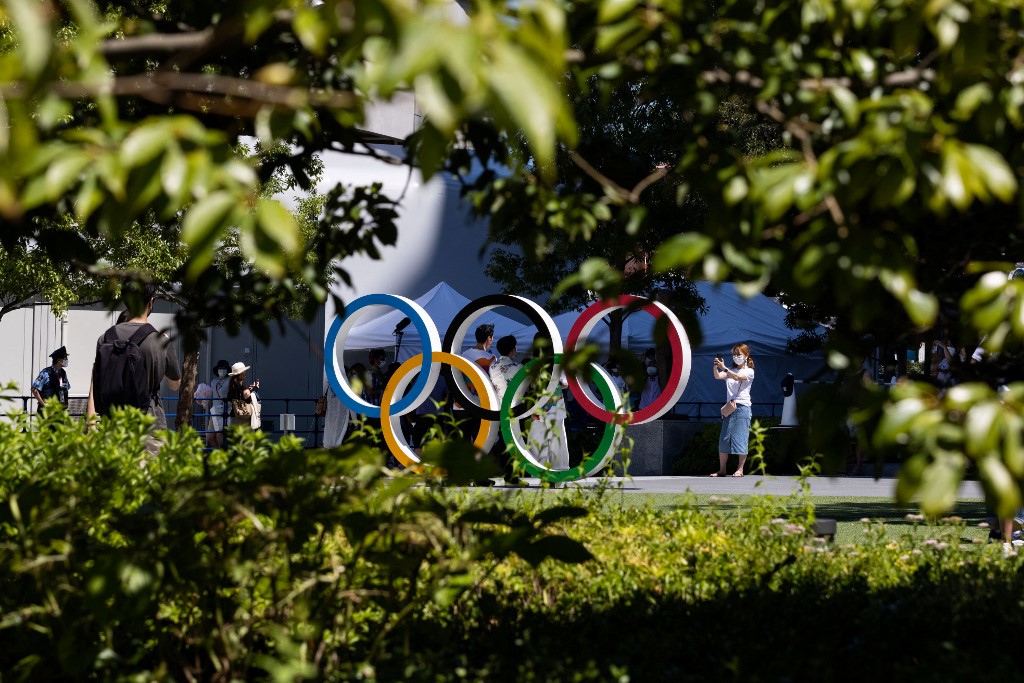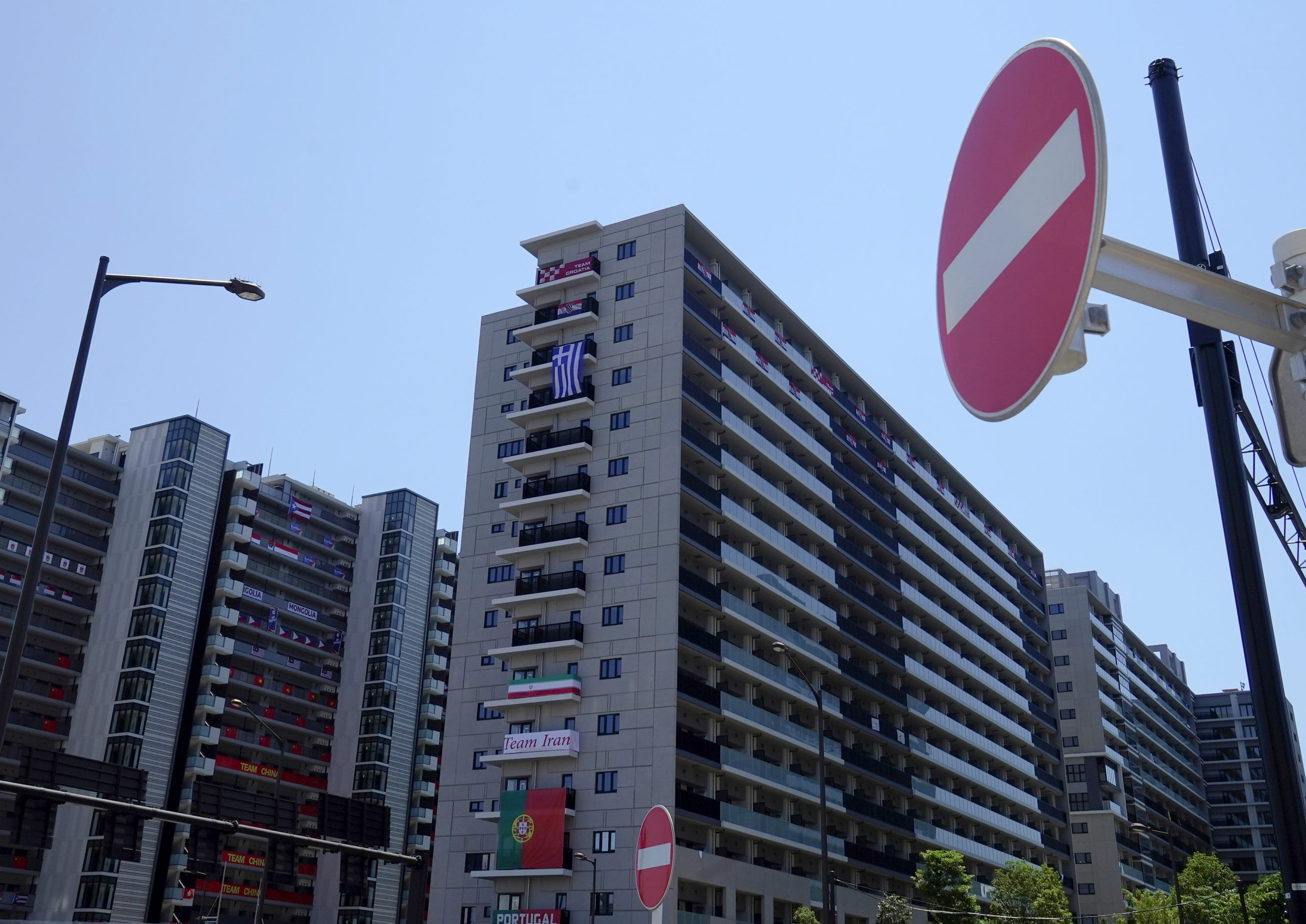Tokyo feared Olympics would spread COVID; numbers suggest that didn’t happen

Visitors pose for pictures with the Olympic Rings at the Japan Olympic museum outside the Olympic Stadium, main venue of the Tokyo 2020 Olympic Games, in Tokyo on August 5, 2021. (Photo by Yuki IWAMURA / AFP)
TOKYO—Before the Olympics began, Japan had feared that the 2020 Games, with thousands of officials, media and athletes descending on Tokyo in the middle of a pandemic, might spread COVID-19, introduce new variants and overwhelm the medical system.
But as the Games draw near their end, the infection numbers from inside the Olympic “bubble” – a set of venues, hotels and the media center to which those coming for the Games had been mostly confined – tell a different story.
Article continues after this advertisementFeaturing more than 50,000 people, what amounted to possibly the largest global experiment of this kind since the pandemic began, appears to have largely worked, organizers and some scientists say, with only a sliver of those involved infected.
“Before the Olympics, I thought people would come to Japan with many variants and Tokyo would be a melting pot of viruses and some new variant would emerge in Tokyo,” Kei Sato, a senior researcher at the University of Tokyo said.
“But there was no chance for the viruses to mutate.”
Article continues after this advertisementThe main reason for the low number of infections was a vaccination rate of more than 70% among the Olympians, organizers and the news media, daily testing, social distancing and a bar on domestic and international spectators, organizers say.
Brian McCloskey, the lead adviser on the “bubble” to Olympic organizers, said he would not point to anyone specific measure that worked best.
“It comes as a package, it’s the package that works most effectively and I think that will still be the message after these Games and is still the message irrespective of vaccinations,” McCloskey said at a news conference on Saturday.
The organizers recorded 404 Games-related infections since July 1. They carried out close to 600,000 screening tests with the infection rate of 0.02%.
The situation inside the “bubble” stood in sharp contrast to outside, with a surge in infections fuelled by the Delta variant hitting daily records and for the first time crossing 5,000 in the host city, threatening to overwhelm Tokyo’s hospitals.
MASKS AND WARNINGS

Traffic signs are seen at the athletes’ village for the Tokyo 2020 Olympic Games, in Tokyo, Japan, July 22, 2021. REUTERS/Naoki Ogura REFILE – QUALITY REPEAT
In the bubble, reporters, during their two-week quarantine, had to report their temperature and condition daily and download a contact-tracing app. They were banned from public transport and masks at the media center were required at all times.
There were no serious cases of COVID-19 in the Olympic village, said McCloskey, where more than 10,000 athletes stayed during the Games, sometimes two to a room.
While McCloskey said that more research needed to be done, he said that at present the experts’ “belief” was that the infections among overseas visitors in the bubble were brought into the country, rather than occurring locally.
McCloskey echoed the Japanese Prime Minister Yoshihide Suga in saying that he did not think the Games contributed to the spike in infections in Tokyo.
He said that, “the closer anyone was to the athletes and to the interface between the international community and the domestic Japanese community the more they were tested.”
“And it is that protection of the link between that interface, between the international and domestic, that gives us the confidence to say that there wasn’t spread between the two,” said McCloskey.
Some experts, such as Koji Wada, professor of public health at the International University of Health and Welfare in Tokyo, have said it was too early to draw conclusions on the direct impact of the Games on the spread of the virus in the city.
But Wada and others have said the Games have undermined public messaging, with authorities calling on people to stay home to avoid contact with others, while athletes screamed, hugged and patted each other on the backs during competitions.
Health data collected during the two weeks of the Games, including inside the athletes village, would be analyzed and published so countries could use it to help plan their responses to the coronavirus, McCloskey said.
RELATED STORIES
Olympic participants warned against eating out over COVID-19 fears
Tokyo Olympic village safe, positive COVID-19 cases to be expected
‘Can’t help but cheer’: Some in Japan warm to Tokyo Olympics
For more news about the novel coronavirus click here.
What you need to know about Coronavirus.
For more information on COVID-19, call the DOH Hotline: (02) 86517800 local 1149/1150.
The Inquirer Foundation supports our healthcare frontliners and is still accepting cash donations to be deposited at Banco de Oro (BDO) current account #007960018860 or donate through PayMaya using this link.